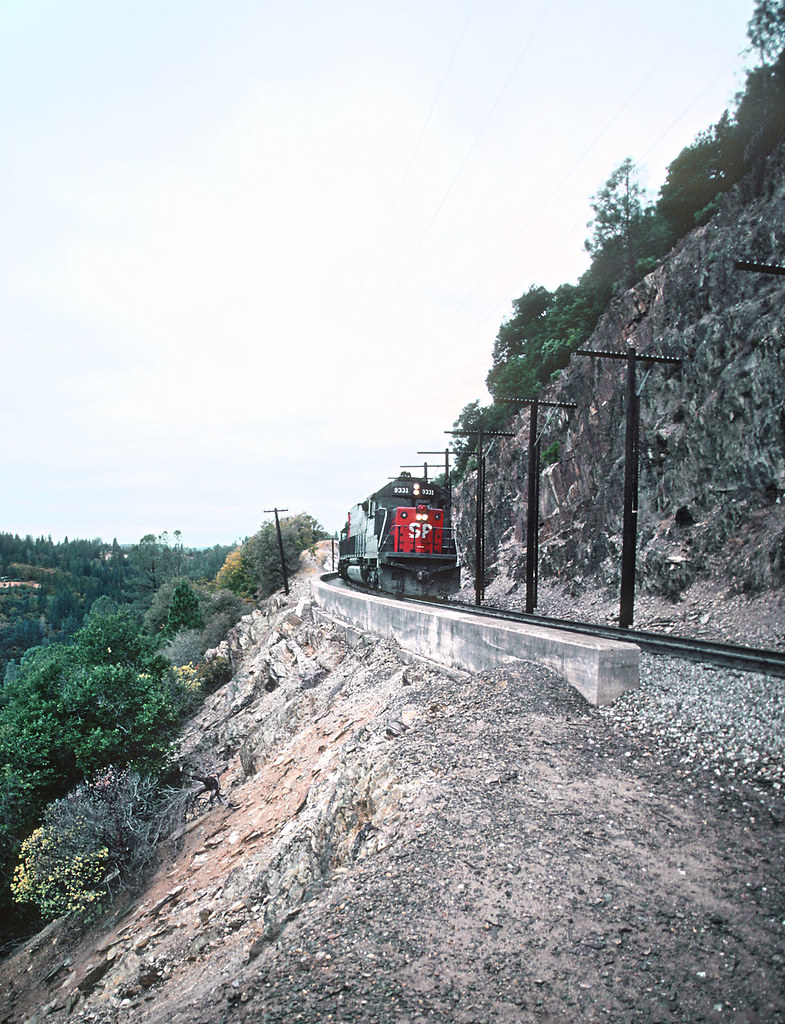
Cape Horn in Donner Pass is a renowned train observation spot located in the Sierra Nevada mountains of California. It offers breathtaking views of the rugged landscape and the historic transcontinental railroad. Visitors can watch trains navigate the dramatic curves and steep cliffs, making it a popular spot for rail enthusiasts and photographers.
Photos
Sign in to upload photos
No Photos Yet
Be the first to share photos of this location!
Cape Horn (Donner Pass) – Colfax, California, USA | Train Spotting Location
Trainspotting Experience
A typical visit finds observers standing on a shelf of rock or at the established public overlook, eye-level with passing locomotives that seem close enough to touch yet are safely across the deep cut. Trains approach from the west with a steady climb out of Colfax, their horns bouncing off canyon walls before the head-end rounds the sweeping, horseshoe-shaped curve. Because the grade stiffens to roughly 2 percent, most heavy freights add mid-train or rear distributed power, giving viewers a prolonged parade of locomotives, rolling stock, and helper sets that can stretch for a solid three to four minutes. Speeds are moderate—about 20–30 mph uphill, 25–35 mph downhill—so photography is relaxed and detail shots are easy. Expect pronounced flange squeal on the tight curve, subdued only by the low roar of the canyon wind and the distant rush of the North Fork American River 1,300 feet below.
Landscape, Setting & Local Atmosphere
Cape Horn sits around 2,400 feet in elevation on the western slope of the Sierra Nevada. The immediate surroundings are a rugged mix of exposed granite, Ponderosa pine, and manzanita clinging to steep escarpments. To the south, the canyon drops abruptly, offering panoramic views toward Iowa Hill and the green ribbon of river far beneath. Summers bring warm, dry air scented with pine resin; afternoons can be hazy with up-drafting canyon heat. In winter, light snow occasionally dusts the ties, though heavy snowfalls generally stick higher up toward Donner Summit. Clear mornings often feature golden side-lighting, while late afternoons bathe the rock face in soft, reddish hues—an atmosphere equal parts tranquil and electrifying when a freight emerges around the bend.
Type & Frequency of Train Activity
Union Pacific operates the line with roughly 14–20 freight movements on an average weekday, though totals fluctuate with seasonal traffic surges over the Transcon. Expect intermodal and manifest freights to dominate, typically led by GEVOs or EMD SD70ACe units. Autoracks, grain blocks, and occasional coal or empty tanker trains add variety. Amtrak’s California Zephyr passes once daily in each direction, usually mid-morning westbound and late afternoon eastbound, providing the lone scheduled passenger appearance. Maintenance windows sometimes shift traffic to the parallel Feather River Route, so checking dispatcher radio (Roseville Sub, AAR 160.515 MHz) or online trackers helps time a visit.
Best Angles for Photos & What Railfans Enjoy Most
The signature shot is from the open ledge just west of the curve, where a 50-mm to 85-mm lens frames the entire train hugging the cliff with the canyon yawning below. Morning light favors eastbounds; late day is optimal for westbounds descending toward Colfax. A wide-angle from the upper trail captures sweeping vistas, while telephoto work from the eastern ridge compresses locomotives against layered pine-clad slopes. Fog occasionally pools in the river gorge at dawn, creating ethereal scenes as head-lights pierce the mist. Because the track is unfenced but perched on a narrow bench, staying on public ground is essential; drone flights are popular but require strict altitude management to avoid rotor wash fouling pine branches and to keep clear of Union Pacific right-of-way.
Historical or Cultural Relevance
Blasted in 1865–66 by Chinese laborers for the Central Pacific Railroad, Cape Horn was considered an engineering marvel of the first transcontinental route. Legend holds that workers were lowered in baskets to drill and powder the nearly vertical cliff—a story confirmed in period newspaper accounts. The alignment remains virtually unchanged, a living classroom in 19th-century survey daring. Interpretive plaques at the overlook recount both the human cost and technological triumph, tying modern rail operations to their Gold-Rush era origins. Nearby Colfax retains a classic wooden depot from 1905, still used by Amtrak and preserving the line’s frontier heritage.
What Makes This Spot Different
Many Sierra foothill locations offer mountain railroading, but Cape Horn uniquely combines a 180-degree canyon view with close-proximity curvature that keeps the entire consist visible for almost its full passage. The acoustic chamber effect magnifies every horn blast, while the vertical drop just yards from the ballast gives photos an unmistakable sense of drama rarely matched outside landmark sites like Tehachapi Loop or Feather River Canyon. Add the fact that the overlook is publicly accessible without scrambling or trespass, and you have a prime venue that balances convenience with jaw-dropping spectacle.
Localisation
Coordonnées :39.123800, -120.940462
Seasonal Information
Cape Horn in Donner Pass offers stunning train views year-round. Spring and fall provide mild weather and vibrant scenery. Summer offers long daylight hours, while winter showcases snow-covered landscapes. Check for special excursions and be prepared for weather changes in this mountainous area.
Other Interesting Locations
Looking for more spots? Browse the complete list of train spotting locations.
Quick Information
Country
USA
Region / State / Province
California
City
Colfax
Spot Type
Scenic Overlook
Best Times
The best hours to observe trains at Cape Horn (Donner Pass) are during daylight, especially morning (8-10 AM) and late afternoon (3-5 PM) for optimal lighting and train frequency.
